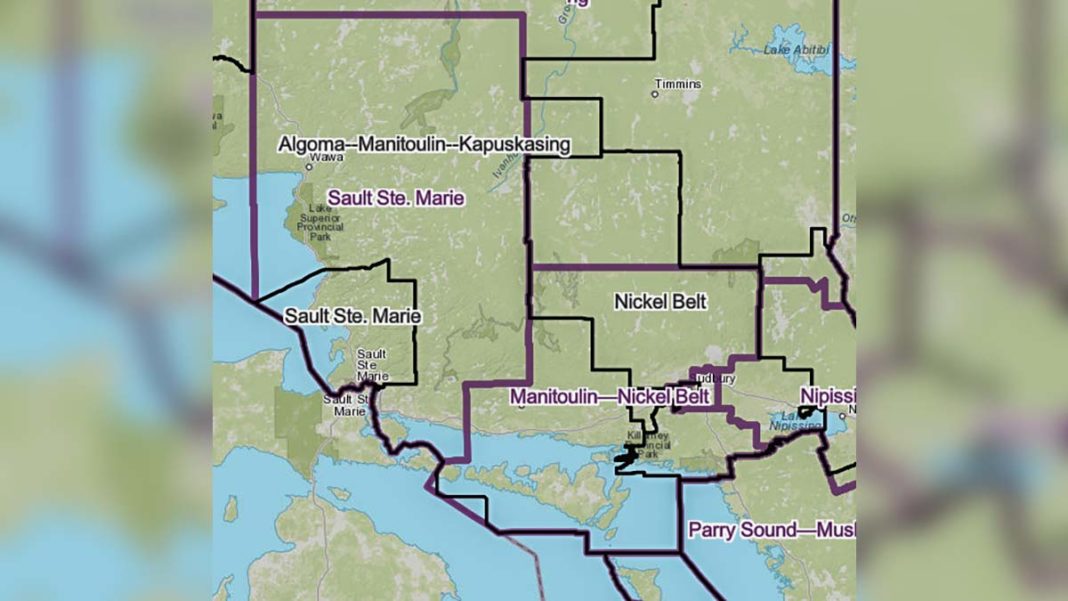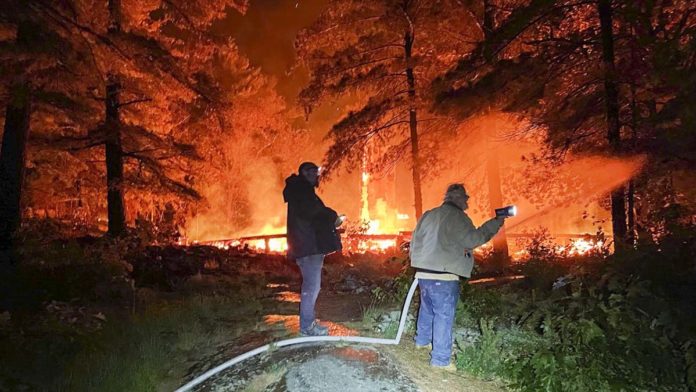NORTHERN ONTARIO—Members of Parliament (MP) representing all of Northern Ontario, including Algoma-Manitoulin-Kapuskasing (AMK) and regardless of party affiliation, have jointly expressed concerns about proposed changes to federal electoral boundaries and have received support from the Federation of Northern Ontario Municipalities (FONOM) and some municipal councils.
The MPs have penned an open letter to the Federal Electoral Commission of Ontario regarding the proposed changes. “Northern ridings will be getting a big hit if the changes are made the way they are being suggested,” said AMK MP Carol Hughes. “MPs from all 10 ridings are in support of the letter.”
If the proposed changes go ahead, the North will lose a seat, but there are other impacts as well. For example, the North would also lose over $1 million in the Canada Summer Jobs program, MP Hughes explained.
In the letter, MPs express their concern that the proposed changes would result in the loss of a seat in Northern Ontario, decreasing the number of seats in the region from 10 to nine. These changes, they argue, do not reflect the size and unique challenges of Northern Ontario.
In addition to calling on the Commission to maintain the current number of electoral districts in Northern Ontario, the MPs raise concerns about the limited number of public hearings being held in the region. They are not opposed to adjustments, they said, but the current number of electoral districts in Northern Ontario must be maintained.
“We understand that the Commission has been seized with the difficult tasks of reviewing and adjusting riding boundaries, but Northern Ontario should not pay the price for having its representation dwindle in order to satisfy the population growth in bigger centres which have access to better infrastructure and resources,” the MPs wrote.
“Effective representation should ensure that MPs are accessible, and that Canadians have equal access to federal government services, regardless of where they live. This has traditionally been a challenge for Northern Ontario residents, particularly in rural and remote communities where there is a lack of public transportation, reliable cellular and internet service, and access to government agencies. For these Canadians, MPs are a gateway to the federal government. To reduce the number of representatives for these individuals is to diminish their access to federal government services and to lessen their voices in parliament.”
The MPs said the “mix of physical and human geography should be balanced by what can be reasonably expected of any single MP and what level of representation can be seen as being the most balanced and fair.”
For example, they wrote, the proposed electoral district of Kiiweginoong-Mushkegowuk would be 520,307 square kilometres, the geographical equivalent of France. Compare this to Brampton, where the Commission is recommending a sixth riding be created in a city that is only 266 square kilometres. “You can see why it is difficult to substantiate the loss of a Northern riding.”
The Electoral Boundaries Readjustment Act provides the ground for departing from the normal rule set out and for exceptions to population variances “in circumstances viewed by the Commission as being extraordinary,” pointing out that was the basis for maintaining Kenora as an undersized riding in the last redistribution. This should continue to be the basis in ensuring the viability of the existing ridings in Northern Ontario, especially those which are made up of small rural communities such as that of Algoma-Manitoulin-Kapuskasing, they said.
In his letter to the Commission, FONOM President Danny Whalen commended the Commission for adding Indigenous representation to the redistribution plan for Northern Ontario but shared concerns about the plan’s negative effects on Northern Ontario.
“Geographically, Northern Ontario is quite large,” he wrote. “The distance from North Bay to the Manitoba border is 1,623 kilometres (the distance from North Bay to Charlottetown, Prince Edward Island is 1,693 kilometres). Your research shows you that the existing ridings are large already. Currently, the members have a difficult job fairly representing their constituents. The MPs do an admirable job and represent Canada well, but we believe the new alignments will make their efforts even more difficult.”
FONOM asked the Commission to retain the current 10 electoral districts, especially in the Northeast, “as any redistribution will divide our established First Nations, Francophone and municipal associations.”
FONOM also noted concerns about the limited number of planned consultations for Northern Ontario, and the timing of the sessions falling in the middle of the annual hunting season. “The timing of the Commission’s consultation highlights further the lack of understanding for our part of Ontario,” Mr. Whalen wrote.
Mr. Whalen also pointed out the redistribution website is very hard to navigate. “We believe anyone using the site to find the impacts on their community would be hard-pressed to get the information they seek,” he wrote, and recommended the Commission improve upon this platform for the next realignment in 2032.
Billings Township also offered their support, moving to pass a draft resolution provided by MP Hughes that states in part, “Be it resolved that this council calls on the Electoral Boundary Commission to maintain the electoral representation for Northern Ontario and ensure that any boundary changes are done in a manner that responds to regional and local need.”
“The resolution says it all,” stated Councillor Sharon Alkenbrack and Councillor Michael Hunt agreed.
Councillor Bryan Barker said it’s important that Northern Ontario not lose funding or an additional voice in parliament.
Council for the Town of Northeastern Manitoulin and the Islands (NEMI) passed a similar resolution. NEMI Mayor Al MacNevin told The Expositor that MP Hughes had attended a council meeting last Tuesday. “Carol explained what the impacts will be,” he said. “She certainly did her homework as the MP. The biggest loss we would face is the loss of an MP in Northern Ontario. This is huge. We don’t have enough of a voice as it is.”
NEMI council passed a motion expressing concern with the proposed changes, and stating that NEMI and other municipalities should be consulted to see if the changes being proposed are satisfactory. “We’re quite concerned with the proposal. It’s a big deal and it looks like they are trying to stick it to the North again,” said Mayor MacNevin. “We asked for a review to be done and to have the opportunity to explain our issues and concerns.”
He said NEMI will be attending a virtual meeting taking place in Timmins with the Commission.





